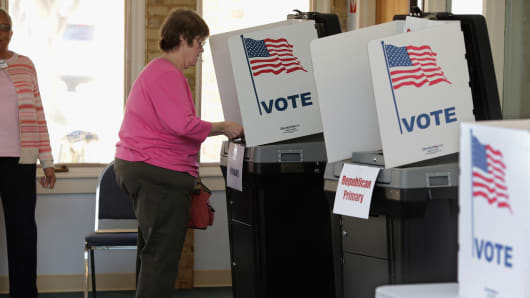This was originally published on TheHill.com.
We live in an era of rampant voter suppression. Stories about new voter identification laws and aggressive purges of registration rolls fill newspaper headlines on a daily basis, and rightfully so. Nothing more seriously undermines democracy than intentional, systematic suppression of lawful voting.
Yet, amidst growing cries for electoral reform, the biggest voting obstruction of them all goes unmentioned: the simple and devastating fact that we hold federal elections on a Tuesday in November, when more than one hundred million Americans are at work or in the classroom.
Voting on Tuesday was a good idea in the 1800s, when Wednesdays were market days, weekends were dedicated to worship, and farmers needed time to travel to and from their county seat's election box. What began as an accommodation for farmers on horseback has since become an obstacle, real and symbolic, to democratic participation in America.
The demands of school and work schedules keep millions of Americans, especially those with children or long commutes, from ever getting to their polling stations. Countless other students and workers who do manage to cast their ballots would love to be even more involved in the process — whether by driving elderly neighbors to the polls, helping illiterate voters understand their ballots, or serving as a poll watcher to deter foul play — but can't afford to skip class or take off a shift.
Just as importantly, our election timing sends a message: if you vote, great, but if not, you and everyone else have a good excuse, so we'll let it slide. This only reinforces already-rampant voter apathy and cynicism and disgust with our elected officials.
By treating Election Day like any other Tuesday, we're knowingly suppressing democratic participation. In 2014, less than thirty-seven percent of voting-eligible Americans cast their ballots — when more than one hundred and forty million adults are eligible to vote but don't, their silence is deafening.
The ideal solution is simple: Congress should make Election Day a national holiday, or move Election Day to the weekend. Yet, few of us, especially those who have worked on Capitol Hill, harbor hope of such reforms coming from Washington D.C. any time soon. With daily press conferences, television interviews, and fundraisers filling their schedules, our elected representatives can't find the time for an honest conversation, let alone action, to defend our right to vote. We can't afford to wait until they, someday, get around to it.
Instead, let's call upon our schools and employers to act locally to enact real change in our communities, starting today. I'm proud to say that Northwestern University School of Law is leading this charge.
Northwestern Law has cancelled all classes on Election Day, not only to encourage students and faculty to cast their ballots but also to connect them with volunteer organizations throughout Chicago, groups that work tirelessly to ensure that the election is free and fair. More than seven hundred lawyers and lawyers-in-training will be freed from one day's work to leave their mark on the 2016 election. Northwestern Law students and faculty will be an active part of our democratic process, not just ivory tower observers or participants of convenience.
Other colleges and universities, especially law schools, in Chicago and nationwide should follow and end the absurd hypocrisy of researching and dissecting the law and championing the importance of democracy while forcing students and faculty to sit on the sidelines on the most important day of the year.
Eloquent lectures on the American Revolution and stirring articles about the First Amendment mean little when millions of ballots are left empty. Law schools, especially, have an obligation to practice what they preach.
Commentary by Beau C. Tremitiere, editor-in-chief of the Northwestern University Law Review who previously served as an aide in the United States Senate. Tremitiere is a Next Generation Leader with the American Constitution Society, and he serves as co-chair of Election RAVE, a non-partisan campaign to increase electoral participation and education.


